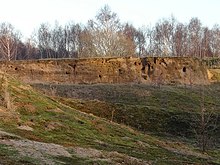Whisby Moor
Geography

Whisby Moor is situated geographically 5 miles (8 km) south-west from Lincoln city centre, with the village of Whisby less than 1 mile (1.6 km) to the north-west. The Nottingham-Lincoln Line runs through the Moor. The southern part of the Moor, including the Natural World Centre is in the parish of Thorpe on the Hill.
Whisby Nature Park

Former sand and gravel pits have been filled and turned into mesotrophic lakes, surrounded by wet willow scrub and now form part of Whisby Nature Park. The nature reserve was established in 1985. The park opened in 1989 on either side of the Nottingham to Lincoln railway line. It was designated a Local Nature Reserve in 2002.
The park has breeds of Shetland cattle and is home to a variety of bird species including wigeon, teal, tufted duck, pochard and goldeneye, great crested grebes, mallard and kingfisher, which can be observed from several bird hides. Whisby holds a substantial population of nightingales, which have become synonymous with the reserve. The park is also home to the Hazel Pot Beetle, a leaf beetle of the Cryptocephalinae subfamily; it was released into the park in November 2000. Plants include Dactylorhiza praetermissa, Trifolium arvense and a bicolour form of Cytisus scoparius.
A visitor centre has been established at Whisby nature reserve, known as the Natural World Centre and is run on behalf of North Kesteven District Council. The nature reserve hosts training courses, talks and events for children.
Many unusual animals and plants are found in Whisby. For example, in 2018 large numbers of bird watchers were attracted to the reserve to see a melanistic blue tit. Not all parts of the nature reserve are open to the public and some areas are grazed by cattle and sheep to promote the growth of smaller plants. In 2017 The Guardian included Whisby Nature Park in a list of five of the best birdwatching sites in the UK, particularly as a place to hear nightingales.
References
- ^ "Whisby Nature Park". Local Nature Reserves. Natural England. Retrieved 4 August 2013.
- ^ "Map of Whisby Nature Park". Local Nature Reserves. Natural England. Retrieved 4 August 2013.
- ^ "Whisby Nature Reserve". Lincolnshire Wildlife Trust. Retrieved 29 April 2019.
- ^ "Natural World Centre". Naturalworldcentre.co.uk. Retrieved 25 April 2011.
- ^ Natural World Centre - What's On
- ^ Express - Melanism: Blue Tit has Rare Black Face at Whisby Nature Reserve. Retrieved 24 April 2019.
- ^ The Guardian - Five of the UK's Best Birdwatching Sites. Retrieved 24 April 2019.
External links
- Lincolnshire Wildlife Trust
- Natural World Centre
- Doddington and Whisby Parish Council
- Hazel Pot Beetle in May 2002
- Beetle in November 2000